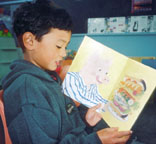|
|
|||||
|
|||||
|
The national monitoring reading and speaking surveys sought information from students about their curriculum preferences and their perceptions of their achievement. Students were also asked about their enjoyment of and involvement in reading and speaking activities, within school and beyond. The surveys were administered in a session which included group and independent tasks, with a teacher reading the survey to year 4 students and available to help with writing. There were four questions that invited students to select up to three choices from lists of 8 to 10 options, two questions that asked for very brief written responses, and 21 questions in a 4 or 5 option rating format, with students circling the option they preferred. Reading
at school |
|
|||||||||||||||||||||||||||||||||||||||||||||||||||||||||||||||||||||||||||||||||||||||||||||||||||||||||||||||||||||||||||||||||||||||||||||
| A
good reader Another question asked the students to select up to three “important things a person needs to do to be a good reader”. They were given 10 approaches to choose from. The responses are shown right. Compared to Mäori students in general education, students in Mäori immersion programmes placed much greater emphasis on learning hard words and listening to the teacher, and less emphasis on concentrating hard, enjoying reading books, and choosing the right book. |
|
|||||||||||||||||||||||||||||||||||||||||||||||||||||||||||||||||||||||||||||||||||||||||||||||||||||||||||||||||||||||||||||||||||||||||||||
In response to a list of seven types of reading material, students indicated up to three which they liked reading in their own time. The responses are shown right. Because of a lower response rate from students in Mäori immersion programmes, it is difficult to compare the two distributions. |
|
|||||||||||||||||||||||||||||||||||||||||||||||||||||||||||||||||||||||||||||||||||||||||||||||||||||||||||||||||||||||||||||||||||||||||||||
| Survey
table Responses to the 21 rating items (below) revealed a number of interesting differences. Compared to Mäori students in general education, students in Mäori immersion programmes were more positive about reading at school, getting a book for a present, and looking at books in a bookshop, but less positive about their teacher reading a story out loud and about talking to their whole class. They reported fewer opportunities to talk to their whole class or to others in their class. |
||||||||||||||||||||||||||||||||||||||||||||||||||||||||||||||||||||||||||||||||||||||||||||||||||||||||||||||||||||||||||||||||||||||||||||||
|
||||||||||||||||||||||||||||||||||||||||||||||||||||||||||||||||||||||||||||||||||||||||||||||||||||||||||||||||||||||||||||||||||||||||||||||
|
Student’s
preferred activities in their own time Compared to Mäori students in general education, students in Mäori immersion programmes were a little more inclined to choose to play video or computer games, and substantially less inclined to choose music as an activity. Reading was the sixth most popular activity for both groups, ahead of just two other options. |
|
|||||||||||||||||||||||||||||||||||||||||||||||||||||||||||||||||||||||||||||||||||||||||||||||||||||||||||||||||||||||||||||||||||||||||||||
| Lanugage
mainly spoken at home Students were also asked “Which language do you mainly speak at home?”.The responses were placed in categories and percentages are tabulated (right). Predictably, students in Mäori immersion programmes were substantially more likely to have Mäori be the main language spoken at home. However, almost two thirds of the Mäori immersion students did not have the learning synergy of predominant home use of the language they were using in school. |
|
|||||||||||||||||||||||||||||||||||||||||||||||||||||||||||||||||||||||||||||||||||||||||||||||||||||||||||||||||||||||||||||||||||||||||||||
| Return to Music Survey >> |
